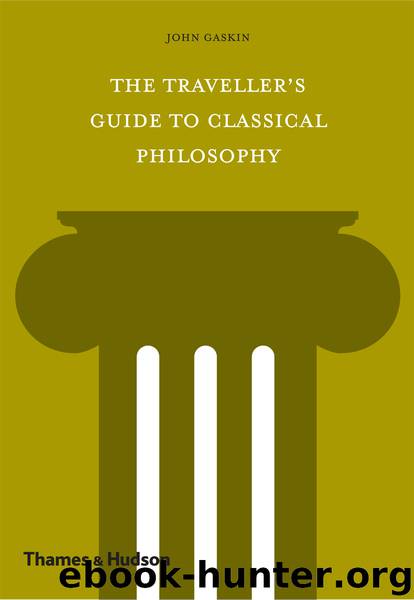The Traveller's Guide to Classical Philosophy by John Gaskin

Author:John Gaskin
Language: eng
Format: epub
ISBN: 978-0-500-5-1565-5
Publisher: Thames & Hudson
Published: 2015-03-02T16:00:00+00:00
The picture is clear: we experience the shadows of what is real. It needs thought and understanding to perceive that things are mere images, and that the real forms of things have another existence.
Plato – always through the voice of Socrates, so there may be some genuine Socratic origin to the idea – urges the two worlds repeatedly, picturesquely and with reasons, the most powerful of which comes from an account of how general names get their meaning – an account he implicitly uses in his quests for definitions of love, fairness, beauty, and so on.
We easily understand how particular or proper names work. John Gaskin is the name of the man to whose words you are now, I trust, attending. It ‘means’ me. Mrs Squeezeaweezle is the name of the woman who fell out of the bus yesterday. But ‘cat’ is not (normally) the name of any particular cat. It is some sort of general name applicable in countless instances. How does this work? Plato’s answer is that ‘cat’ is the particular or proper name of some real entity – the ideal form of a cat – and all lesser, shadow-world, this-world, actual cats in our experience are only able to be called cats because they are like, or approximate in various ways to, the ideal form of a cat. Then comes the big jump: the ideal form exists in another world of full realities. All right, cats are to some people of limited intellectual interest. They can’t count beyond about five, for instance, and they have very few moral sensibilities. It is mathematical concepts and moral or aesthetic abstracts such as beauty, good and justice that best fit and illustrate Plato’s theory of ideal forms.
Consider geometry: a line is defined as that which has length but no breadth. No such thing could be drawn. It couldn’t even be seen. In this case, the fuzzy mark on the paper is manifestly only an attempt, a shadow, of the thing defined. In politics and social life we all too often call something ‘fair’ or ‘unfair’. But the things so named are multifarious, sometimes wildly different; Plato would say that we need to find the best definition of fairness that we can, and that will give us a description, an idea, of the form of fairness that actually exists in the other world. Through their similarity with this ideal form of fairness, all the things we call ‘fair’ in this world are justifiably called ‘fair’.
In conclusion, to know the ideal forms of things, and in particular to know the form of the good, is to have knowledge; and Plato (Socrates?) hopes and expects that the other world of ideal forms will become directly accessible to us when we survive death as intellectual souls and can see the perfect realities themselves.
Accept it or not, Plato’s two-world theory was of incalculable influence. It is the core of the metaphysic that gives rational structure to Christian and Islamic accounts of God, heaven and an afterlife, and it is taken for granted in much of what we think and say.
Download
This site does not store any files on its server. We only index and link to content provided by other sites. Please contact the content providers to delete copyright contents if any and email us, we'll remove relevant links or contents immediately.
Annapurna by Maurice Herzog(3459)
Liar's Poker by Michael Lewis(3436)
A Forest Journey by John Perlin(3062)
Atlas Obscura by Joshua Foer(2943)
The Ogre by Doug Scott(2673)
Cuba by Lonely Planet(2624)
Photographic Guide to the Birds of Indonesia by Strange Morten;(2523)
The Splendid and the Vile by Erik Larson(2448)
Tokyo by Rob Goss(2423)
All Things Reconsidered by Bill Thompson III(2385)
Fatal Storm by Rob Mundle(2207)
INTO THE WILD by Jon Krakauer(2191)
A TIME OF GIFTS by Patrick Leigh Fermor(2191)
Trail Magic by Trevelyan Quest Edwards & Hazel Edwards(2173)
DK Eyewitness Top 10 Travel Guides Orlando by DK(2168)
Touching the Void by Joe Simpson(2124)
Top 10 Dubai and Abu Dhabi by DK Travel(2086)
Abbey in America by Murray John A(2075)
Lonely Planet Australia by Lonely Planet(2070)
